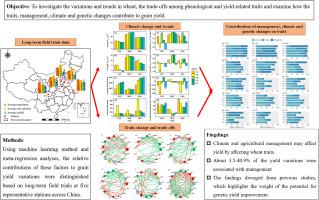Agricultural Systems ( IF 6.6 ) Pub Date : 2022-09-23 , DOI: 10.1016/j.agsy.2022.103521 Yibo Li , Fulu Tao

|
CONTEXT
Concerns about the effects of global warming on crop yields have risen due to stagnating yield progress in recent years. Understanding crop traits and grain yield variations in different climate zones is critical to gain insights into crop response and adaptation mechanisms to ongoing climate change. However, the interactions of genotype, environment and management on crop traits and historical yield progress are lacking.
OBJECTIVE
This study is to investigate the variations and trends in wheat traits in different climate zones across China, trade-offs among phenological and yield-related traits, the effects of genotype, environment and management interactions on wheat traits, as well as the contributions of traits, management, climate and genetic changes to grain yield.
METHODS
The genotype, environment and management interactions on wheat traits and grain yield variations were analyzed based on long-term field trials during 2003–2016 at five representative stations across China. And then, a machine learning method was applied to quantify the relative contributions of these factors to wheat traits and grain yield variations.
RESULTS AND CONCLUSIONS
A significant warming trend during the reproductive growth period and a decreasing trend in solar radiation were observed. Significant trends and variations in wheat traits and significant interactions between genotype, station and year were discovered. Compared with fertilization, grain yield under no-fertilization was significantly lower by 80.3% at five representative stations across China. With local farmer's practices, about 3.5–40.9%, 19.6–58.3% and 0.1–8.2% of the yield variations were associated with agricultural management practices, climate change and cultivar shifts, respectively, contradicting some previous studies which highlight the weight of genetic yield improvement.
SIGNIFICANCE
The findings are valuable for understanding the mechanisms underlying crop traits and grain yield variations, for breeders to breed desirable traits, and for agronomists to adopt suitable cultivars and agricultural management practices.


























 京公网安备 11010802027423号
京公网安备 11010802027423号